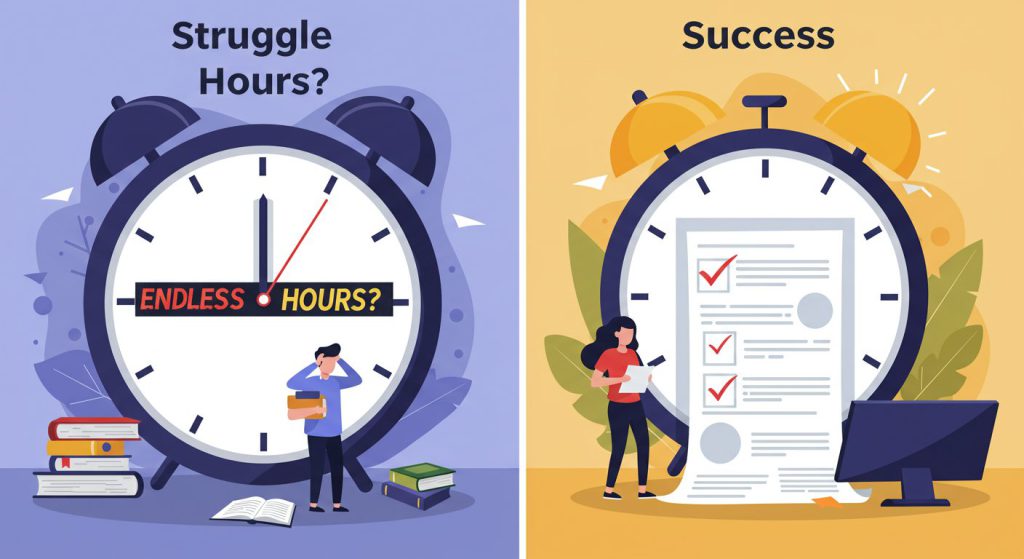As learners, we have all experienced the terrible exhaustion that comes from believing that studying for long hours results in greater learning. But what if you could study less, learn more, and have time for watching your favorite shows or spending time with friends? No, it is not some unrealistic wishful thinking; it is simply the benefits that come with smart learning. This article sets out to help you master deep work, a revolutionary model of study that optimally utilizes time and maximizes results. Whether you are scrambling last minute for finals or taking on multiple college assignments, these approaches will help you feel in command of the study process. Are you prepared to change how you learn? Then let’s get started!
1. Disregard the Time Hypothesis: Effectiveness is Preferable to Efficiency
Did you overlook a friend bragging about studying for 12 hours non-stop? It is human to assume that sitting at your desk increases your chances of acing your exam, but this is a harmful assumption to make. Studying for long durations of time doesn’t equate to learning. The trick is working towards achieving a target rather than focusing on arbitrary metrics like time. Deep work, also referred to as intense focus, enables you to learn complex ideas faster and yield superior results in very limited time.
What if we told you, all you needed to study for 2 hours a day and perform exceptionally well in your exams? Sounds too good to be true, isn’t it? Well, you can do it too. All you need to shift your mindset first. Focus on the things/tasks that are the most impactful, and allow yourself to let go of the “more is better” ideology.
2. Embrace the 80/20 Rule: Focus on What is Important
Let’s say for a second, you only have two hours for studying. How would you spend that time? Would you highlight your notes with neon-colored highlighters, or would you rewrite your entire textbook from scratch? While they might seem productive, they are simply busywork. The 80/20 rule states that “20 % of your efforts produce 80% of your results”. When it comes to studying, it means focusing on high productivity tasks like past papers and topic-specific questions. These tests simulate actual exam environments, identify weak areas, and teach the test-taker to work through the exam rather than to the exam. Sites such as Physics and Math’s Tutor (PMT) or “Save My Exams” have past papers freely accessible. Utilize them! By focusing on practice questions, you will develop strong, instilled, and confident “exam-ready” skills.
3. Sidestep Distractions: Safeguard Your Concentration
Distractions are as enticing as a siren’s song—the phone buzzing, TikTok luring you in, only for two hours to disappear in an instant. We’ve all experienced that moment when we put off studying to scroll mindlessly. So, what can we do? The goal isn’t to remove temptations in our lives (good luck getting rid of Instagram forever). Instead, attempt to work on them. Focus on deep work for two hours and then reward yourself by indulging in Netflix or gaming. Cut yourself some slack, severely mute your phone, toss it in a drawer, silence Wi-Fi, and go extreme. Create a focus bunker where nothing can disturb you. While it may be tough initially, achieving small goals like studying for 30 uninterrupted minutes builds momentum toward larger targets.

4. Establish Actionable Study Goals: Aim for a Target
Have you ever attempted to study only to open your textbook aimlessly? Setting vague intentions only wastes time. Make sure to set goals like “Complete 10 biology past paper questions on cell structure” or “Master plant reproduction topic questions.” Goals like this help focus attention the same way GPS works and aid in problem finding. Precision in goal setting can help you get desired results. An app can also aid in project tracking like an agile scrum board. With task objectives, focus increases at the start with more concentration with finishing tasks leading to a feeling of achievement instead of feeling unorganized.
5. Repetition Builds Passive Recall: Study Smart
In simple terms, studying can be considered as practicing for a physical activity. Training for an exam should not involve reading a book but actively practicing the skill. You would not prepare for a soccer game by reading about soccer, you’d practice kicking the ball. The same applies to a subject as history, if you are rewriting notes claim it as a step forward because but remember it is not exercising your exam muscles, only something like past papers and topic questions that can help you strengthen. Concepts become second nature with practice is the key. Over time feeling like a burden becomes repetition and the more tasks are tackled with less apprehension and more confidence, the more tasks that were once burdensome handled effortlessly. With time, the ability to answer questions without pause will become automatic. Take biology for instance, when faced with “what is the powerhouse of the cell?” the response would be “Mitochondria” without a thought. You will have exams less and less haha prophecies! It is never about ups and downs; it is about the consistent without needed switch and will be able to under prep feeling.
Key Takeaways
- Quality over quantity: Deep work maximizes learning in less time, freeing you for life’s fun stuff.
- 80/20 rule: Prioritize past papers and practice questions for 80% of your results.
- Distraction defense: Delay temptations and create a focus-friendly environment.
- Precise goals: Set specific targets to make every study session count.
- Practice pays off: Regular past paper practice builds exam-ready skills and confidence.
Conclusion: Study Your Way, Smarter
Deep work isn’t a one-size-fits-all magic trick—it’s a flexible tool you can shape to fit your life. Maybe you’re a night owl who thrives at 11 p.m., or perhaps you prefer morning study sprints. The beauty of studying smarter is that it gives you room to experiment and find what works for you. By focusing on high-impact tasks, shielding your attention, and setting clear goals, you’ll not only boost your grades but also reclaim time for the things you love. So, why not give it a try? Start with one two-hour deep work session this week. You might be surprised at how much you can achieve—and how good it feels to study on your terms.
